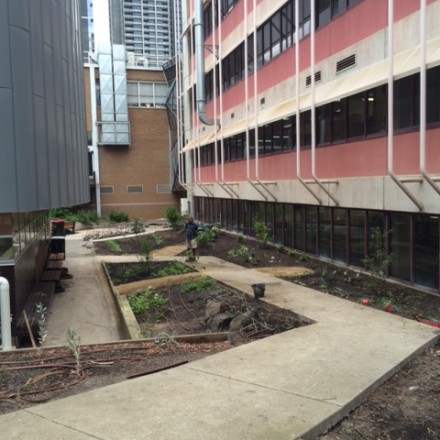Here’s some information about this exciting project….
The Rain Garden will feature a series of beds highlighting edible native plantings on campus, which will be available for use by students and staff.
The garden will also include over 100 different edible plants, including Bush Foods and Herbs, edible flowers and many other common and uncommon vegetables, herbs, fruits and salad plants.
The story below is from the web archive, as it is no long available on the original website….
Edible Garden we designed for William Angliss Institute

NMIT LANDSCAPE TEACHER TIM WILSON WITH STUDENTS BRAD (FAR LEFT)AND DOUG (SECOND FROM RIGHT) PLANTING THE WILLIAM ANGLISS RAIN GARDEN WITH CEO NICHOLAS HUNT AND PATISSERIE STUDENTS CHLOE AND KAMIL WHO WILL USE SOME OF THE EDIBLE PLANTS FOR THEIR NEXT DESSERT CREATION.
Planting has commenced in the William Angliss Edible Rain Garden this week.
The Rain Garden will feature a series of beds highlighting edible native plantings on campus, which will be available for use by students and staff.
In 2013 the Institute received funding from The Office of Living Victoria (OLV) for a Living Green Rain Garden.
The Rain Garden landscape and planting design was planned by landscape designer Karen Sutherland from Edible Eden Design.
NMIT Landscape teachers and students are currently working with William Angliss Environmental Services Supervisor Kim Blamey to finalise the landscaping and plant the garden.
“Rainwater tanks have been installed which means a reduced volume of water will enter the stormwater system now with more efficient use of rainwater runoff, and decreased reliance on mains water,” Kim said.
“Also cleaner water will enter the storm water system due to the filtration system provided by the Rain Garden.”
This project provides a valuable educational opportunity on the themes of integrated water cycle management, wise water use, native edible rain gardens and sustainability, for a broad audience including staff and students, hospitality industry professionals and the public accessing the Institute’s training, restaurants and conference facilities.
The Edible Rain Garden project will also generate a productive educational garden and enhance the aesthetics and liveability of the courtyard space.


Recent Comments